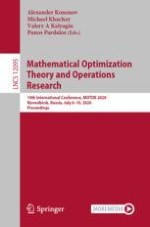2020 | OriginalPaper | Chapter
The Continuous Hotelling Pure Location Game with Elastic Demand Revisited
Author : Pierre von Mouche
Published in: Mathematical Optimization Theory and Operations Research
Publisher: Springer International Publishing
Activate our intelligent search to find suitable subject content or patents.
Select sections of text to find matching patents with Artificial Intelligence. powered by
Select sections of text to find additional relevant content using AI-assisted search. powered by
